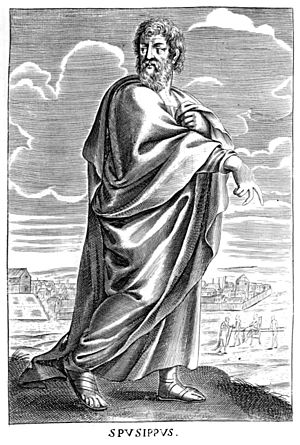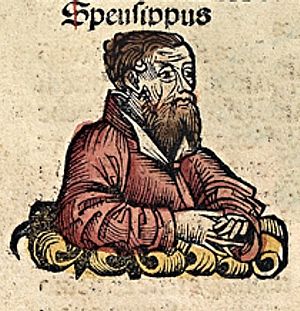Speusippus facts for kids
Quick facts for kids
Speusippus
|
|
|---|---|

Speusippus, 17th-century engraving
|
|
| Born | c. 408 BC Athens
|
| Died | 339/8 BC Athens
|
| Era | Ancient philosophy |
| Region | Western philosophy |
| School | Platonism |
|
Main interests
|
Epistemology, Metaphysics, Ethics |
|
Notable ideas
|
Developed the philosophy of Plato, but rejected the Theory of Forms |
|
Influences
|
|
|
Influenced
|
|
Speusippus (/spjuːˈsɪpəs/; Greek: Σπεύσιππος; around 408 – 339/8 BC) was an ancient Greek philosopher. He was the nephew of the famous philosopher Plato, through Plato's sister Potone.
After Plato passed away in 348 BC, Speusippus, who was nearly 60 years old, became the leader of the Platonic Academy, a famous school in Athens. He led the Academy for eight years. Later, after becoming ill, he handed over his position to Xenocrates. Even though Speusippus followed Plato, he often had different ideas. For example, he did not agree with Plato's Theory of Forms. Plato believed that the "Good" was the most important idea, but Speusippus thought it was less important. He also believed that to truly understand something, you need to know how it is different from everything else.
Contents
Life of Speusippus
Speusippus was born in Athens. His parents were Eurymedon and Potone, who was Plato's sister. He was part of the Myrrhinus family group.
We know that Speusippus went with his uncle Plato on a trip to Syracuse in Italy. During this trip, he showed great skill and wisdom, especially in getting along well with Dion, a powerful leader there. Even other philosophers, like Timon, recognized his good character.
Speusippus was chosen by Plato to be the next leader, or scholarch, of the Platonic Academy. He led the school for eight years, from 348/7 BC to 339/8 BC. He became ill with a long-term sickness that affected his body, likely a stroke. After his death, Xenocrates took over as the head of the Academy.
Speusippus's Philosophy
Speusippus wrote many dialogues and commentaries. While we don't have all his writings today, we know some of his main ideas.
Understanding Knowledge
Speusippus was very interested in how different areas of knowledge connect. He wanted to find similarities between philosophical ideas. He also focused on how to define things by understanding their different types, called genera and species. He believed that to truly define something, you must know all the ways it is different from everything else.
Like Plato, Speusippus thought there was a difference between what we understand with our minds and what we see or feel with our senses. He tried to explain how our senses can lead to real knowledge. He suggested that artistic skill comes from a special ability to tell things apart, which is a kind of smart way of seeing.
Ideas About Reality
Speusippus did not agree with Plato's Theory of Forms. Plato believed in "ideal numbers" (perfect forms of numbers), but Speusippus did not. He thought that different types of things, like numbers, sizes, and souls, had their own unique starting points or principles. Plato, on the other hand, saw them as connected to ideal numbers.
Speusippus also had a different idea about the "Good." Plato believed the "Good" was the ultimate starting point of everything. But Speusippus, like some older thinkers, thought that the starting points of the universe were the causes of good things, but not the good itself. He believed that good and perfect things appear later, as things develop. For example, a seed is the start of a plant, but the beautiful, fully grown plant is the result of its development.
He saw the ultimate starting point as the "absolute One," similar to Plato. However, he didn't think this "One" was an existing thing itself. Instead, he believed all existing things came from its development. Speusippus also thought this "One" had a life-like energy, which helped it grow into good things and even into spirit. He saw spirit as separate from the "One" and from the "Good." He also believed that good was different from pleasure and pain.
Ethics and Morals
Speusippus wrote about important topics like justice, friendship, pleasure, and wealth. He believed that happiness is "a state that is complete in those things that are in accordance with nature." This means happiness comes from living in a way that fits with how things naturally are. He also thought that good people aim for a life free from trouble. His ideas might have influenced later groups like the Stoics and Epicureans.
Speusippus disagreed with another philosopher named Eudoxus about what the "Good" is. Eudoxus thought pleasure was the ultimate good, but Speusippus strongly believed that pleasure was not good. He argued that the Good was something "in between the opposites of pleasure and pain." This debate might have even influenced Plato's own writings.
Speusippus also worked on Plato's ideas about justice and what it means to be a good citizen. He also thought about the basic rules for making laws.
List of Works
Diogenes Laërtius, an ancient writer, listed some of Speusippus's works. He said that all his writings together would fill about 43,475 lines of manuscript.
- Aristippus of Cyrene
- On Wealth
- On Pleasure
- On Justice
- On Philosophy
- On Friendship
- On the Gods
- The Philosopher
- A Reply to Cephalus
- Cephalus
- Clinomachus or Lysias
- The Citizen
- Of the Soul
- A Reply to Gryllus
- Aristippus
- Criticism of the Arts (one book for each art)
- Memoirs (written as dialogues)
- Treatise on System
- Dialogues on the Resemblances in Science (ten books)
- Divisions and Hypotheses relating to the Resemblances
- On Typical Genera and Species
- A Reply to the Anonymous Work
- Eulogy of Plato
- Epistles to Dion, Dionysius and Philip
- On Legislation
- The Mathematician
- Mandrobolus
- Lysias
- Definitions
- Arrangements of Commentaries
See also
 In Spanish: Espeusipo para niños
In Spanish: Espeusipo para niños
- Plato's unwritten doctrines, for debates in the Early Academy over Plato's secret teachings
 | Stephanie Wilson |
 | Charles Bolden |
 | Ronald McNair |
 | Frederick D. Gregory |


